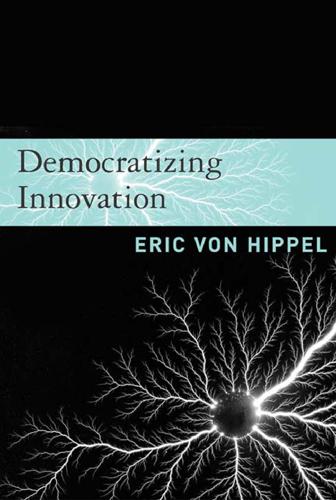
Democratizing innovation
by
Eric von Hippel
Published 1 Apr 2005
It is also becoming clear that the protections afforded by existing intellectual property law can be strategically deployed to achieve private advantage at the expense of general innovative progress (Foray 2004). Consider an effect first pointed out by Merges and Nelson (1990) and further explored as the “tragedy of the anticommons” by Heller (1998) and Heller and Eisenberg (1998). A resource such as innovation-related information is prone to underuse—a tragedy of the anticommons—when multiple owners each have a right to exclude others and no one has an effective privilege of use. The nature of the patent grant can lead to precisely this type of 114 Chapter 8 situation. Patent law is so arranged that an owner of a patent is not granted the right to practice its invention—it is only granted the right to exclude others from practicing it.
…
In this situation I cannot manufacture a rocking chair without getting a license from you for the use of your chair patent, and you cannot build rocking chairs either without a license to my rocker patent. If we cannot agree on licensing terms, no one will have the right to build rocking chairs. In theory and in a world of costless transactions, people could avoid tragedies of the anticommons by licensing or trading their intellectual property rights. In practice the situation can be very different. Heller and Eisenberg point specifically to the field of biomedical research, and argue that conditions for anticommons effects do exist there. In that field, patents are routinely allowed on small but important elements of larger research problems, and upstream research is increasingly likely to be private.
…
Henkel, and E. von Hippel. 2003. “Profiting from Voluntary Information Spillovers: How Users Benefit by Freely Revealing Their Innovations.” Research Policy 32, no. 10: 1753–1769. Hecker, F. 1999. “Setting Up Shop: The Business of Open Source Software.” IEEE Software 16, no. 1: 45–51. Heller, M. A. 1998. “The Tragedy of the Anticommons: Property in the Transition from Marx to Markets.” Harvard Law Review 111: 621–688. Heller, M. A., and R. S. Eisenberg. 1998. “Can Patents Deter Innovation? The Anticommons in Biomedical Research.” Science Magazine 280 (5364): 698–701. Henkel, J. 2003. “Software Development in Embedded Linux: Informal Collaboration of Competing Firms.”
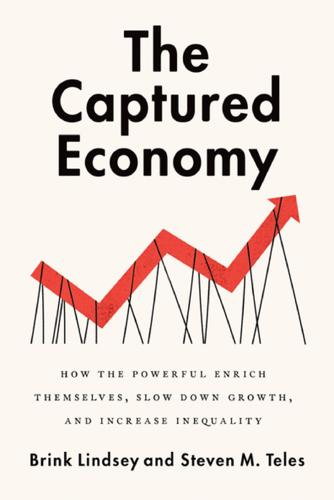
The Captured Economy: How the Powerful Enrich Themselves, Slow Down Growth, and Increase Inequality
by
Brink Lindsey
Published 12 Oct 2017
Such problems can become especially acute in fields of contemporary technological endeavor, such as biomedicine, semiconductors, and software, where promising innovations may conflict with a whole slew of patents by multiple patent holders. Such “patent thickets”12 can cause serious coordination and holdup problems that amount to a “tragedy of the anticommons.”13 In the familiar tragedy of the commons, lack of clear ownership rights creates perverse incentives that lead to resource depletion. Here, the mirror-image problem arises, as an excess of overlapping and perhaps conflicting property claims leads to underutilization of resources, especially underinvestment in incremental, sequential innovation.
…
Senate, 85th Congress, 2nd session, 1958. 11.Joan Robinson, The Accumulation of Capital (London: Macmillan, 1956), p. 87. 12.See Carl Shapiro, “Navigating the Patent Thicket: Cross Licenses, Patent Pools, and Standard Setting,” in Innovation Policy and the Economy, vol. 1, ed. Adam B. Jaffe, Josh Lerner, and Scott Stern (Cambridge, MA: MIT Press, 2001), pp. 119–50. 13.For a discussion of the tragedy of the anticommons in the intellectual property context and elsewhere, see Michael Heller, The Gridlock Economy: How Too Much Ownership Wrecks Markets, Stops Innovation, and Costs Lives (New York: Basic Books, 2008). 14.David Kravets, “Web Browsing Is Copyright Infringement, Publishers Argue,” Ars Technica, June 5, 2014, http://arstechnica.com/tech-policy/2014/06/web-browsing-is-copyright-infringement-publishers-argue/. 15.Fred von Lohmann, “Google Cache Ruled Legal,” Electronic Frontier Foundation, January 25, 2006, https://www.eff.org/deeplinks/2006/01/google-cache-ruled-fair-use. 16.For a thought experiment on how one hypothetical law professor’s typical day could include 83 acts of copyright infringement with potential liability of $12.45 million (in addition to possible imprisonment), see John Tehranian, “Infringement Nation,” Utah Law Review (2007): 537. 17.For percentages of books in the public domain and under copyright but out of print, see Jeffrey Toobin, “Google’s Moon Shot,” New Yorker, February 5, 2007, http://www.newyorker.com/magazine/2007/02/05/googles-moon-shot. 18.See Timothy B.
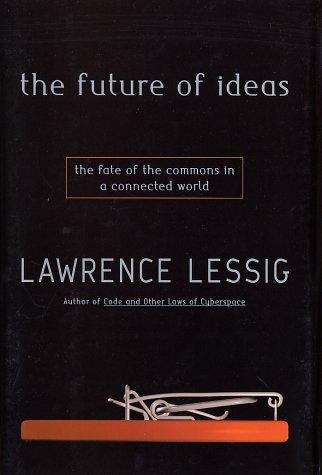
The Future of Ideas: The Fate of the Commons in a Connected World
by
Lawrence Lessig
Published 14 Jul 2001
Census Bureau, available at http://www.census.gov/prod/2/gen/96statab/transind.pdf. 5 Rose, “The Comedy of the Commons,” 759, citing President of Cincinnati v. Lessee of White, 31 U.S. (6 Pet.) 429 (1832) (recognizing an implied dedication of a square for traditional public use). See also Hanoch Dagan and Michael A. Heller, “The Liberal Commons,” Yale Law Journal 110 (2001): 549; Michael A. Heller, “The Tragedy of the Anticommons: Property in the Transition from Marx to Markets,” Harvard Law Review 111 (1998): 621, 622-26; Alison Rieser, “Prescriptions for the Commons: Environmental Scholarship and the Fishing Quotas Debate,” Harvard Environmental Law Review 23 (1999): 393; Elinor Ostrom, Governing the Commons: The Evolution of Institutions for Collective Action (Cambridge, England, and New York: Cambridge University Press, 1990), 2-23.
…
Wilke, “AOL and Time-Warner Pledge Cable Access to Ease FTC Fears,” Wall Street Journal, December 14, 2000. 46 Or alternatively, a tragedy of an anticommons. The opportunity for any number of players to interfere with open access to the network could be viewed as an anticommons. See Michael A. Heller, “The Tragedy of the Anticommons,” Harvard Law Review 111 (1998): 621; James M. Buchanan and Yong J. Yoon, “Symmetric Tragedies: Commons and Anticommons,” Journal of Law & Economics 43 (2000): 1. 47 This is not quite the tragedy that Hardin is describing. There is no common physical resource that is being overused. But there is a common virtual resource—the opportunity to innovate freely on the network—that is being misused by restricting the scope of that innovation with respect to one part of the network.
…
In today's business environment, in which a company's market value is measured with increasing frequency by the intellectual property it owns, arsenals of patents—specious or not—make an unfortunate kind of sense.” Ibid. 114 Warshofsky, The Patent Wars, 170-71 (emphasis added). 115 Michael A. Heller, “The Tragedy of the Anticommons: Property in the Transition from Marx to Markets,” Harvard Law Review 111 (1998): 621. The general issue of patents in sequential, or cumulative, innovation is addressed by Suzanne Scotchmer, “Standing on the Shoulders of Giants: Cumulative Research and the Patent Law,” Journal of Economic Perspectives 5 (Winter 1991).
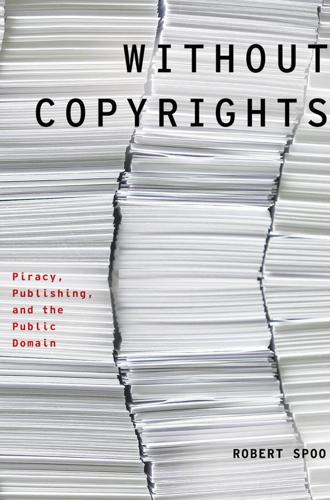
Without Copyrights: Piracy, Publishing, and the Public Domain (Modernist Literature and Culture)
by
Robert Spoo
Published 1 Aug 2013
When we step back to view the world copyright map, we see profound disharmonies everywhere: a vast patchwork of laws in which the same work is protected in some countries and unprotected in others; laws that restore a century-old work to copyright in some countries and leave it in the public domain in others. I call this state of affairs a tragedy of the uncoordinated commons—a variation on the concept of the tragedy of the anticommons. An anticommons is the antithesis of a commons. It results from a coordination breakdown in which multiple ownership claims in the same resource cause the resource to be underused. In post-Soviet Moscow, for example, several owners typically enjoyed competing rights in the same commercial storefront, with the result that coordination of rights proved difficult or impossible, and many storefronts remained empty.54 Whereas a commons is threatened with overuse—too many exploiters of a single unowned resource—an anticommons is threatened with underuse—too many owners of a single proprietary resource.
…
Case 7 O 847/03 Himmelsscheibe von Nebra [2004] GRUR 672 (LG Magdeburg 10/16/2003). The significance of the word lawfully is examined in Walter and Lewinski, European Copyright Law, 575–76. 53. Copyright and Related Rights Regs., 1996, S.I. No. 2967, pt. II, 16(3) (U.K.). 54. See Michael Heller, “The Tragedy of the Anticommons: Property in the Transition from Marx to Markets,” Harvard Law Review 111 (1998): 621–88. 55. Golan, 565 U.S. ___, 132 S. Ct. at 906 (Breyer, J., dissenting). BIBLIOGRAPHY Periodicals, scholarly journal articles, and archival materials, as well as judicial decisions, statutes, and other legal authorities, are cited in full in the notes.
…
., 103 trade courtesy, 2–3, 18–19, 28, 32–36, 38–39, 42–43, 49, 275–76 as alternative to copyright, 64 as anticompetitive monopoly, 53–58, 62, 245 apparent decline of, 53–62 and booksellers, 58, 256–57 in Britain and Ireland, 34 bundling copyrighted and uncopyrighted matter, 92, 111–12, 246, 255 as business morality, 5–6, 33, 41–43, 48, 50, 52, 54, 80, 108, 112–13, 256–57 and Chace Act, 59–64, 108, 245 criticisms of, 28, 53–56 as disseminative practice, 4, 49, 114, 129, 188–89, 262 as imitation of copyright law, 5, 18, 33, 39, 48, 53, 257 informal rights in uncopyrighted works, 5, 18, 33, 37–42, 155, 236, 245–47, 257 acquired on announcement of publication, 5, 32–33, 37–38, 40, 44, 108, 130, 247, 255 acquired through advance sheets, 28, 37, 39–40, 44 acquired through author contracts, 33, 37–38, 255 arbitration and settlement of disputes over, 38, 47–49, 63, 109, 202 and authors’ authenticating letters, 41–42, 251–52, 255 transfer of, 33, 40 and literary agents, 58–59, 62, 245 and music publishers, 33 and newspapers, 283 n.95 and novice publishers, 35, 47, 49–50, 52, 110 origins of, 34 payment to authors, 10–11, 14–15, 17–18, 28, 31, 33, 38–41, 44, 47, 51–52, 59, 62, 64, 129, 138, 170, 197, 201, 209, 245, 255–56 punishments for transgressors, 4, 5, 7, 33, 35, 36, 43, 155, 182 predatory pricing, 32, 43, 46, 49, 85, 248, 250, 285 n.151 public shaming and negative gossip, 43–46, 48–49, 64, 110, 113, 182, 184, 187–90, 234–36, 245, 249–50, 257 refusal to deal, 43, 45, 184, 186–87, 311 n.159 retaliation, 43, 46–47, 49, 51, 63, 108 as regulation of competition, 5, 18, 32–33, 36, 43, 52, 62–63, 114, 190, 245, 256 relationships with authors, 33, 37–39, 41–44, 47, 51, 55–56, 59, 82, 108–9, 112 transgressors of, 6, 40, 42–47, 49–50, 52–53, 62–63, 81–82, 85, 109, 113, 186, 189, 234 in the twentieth century, 5, 8, 10–11, 18–19, 63–64, 84–85, 107–14, 178–79, 184–91, 196–97, 234–37, 245–58, 261–62, 296 n.197 See also piracy, literary; public domain, American; social norms trademark law, 198, 225–30 Trade-Related Aspects of Intellectual Property Rights (TRIPS), 264 tragedy of the anticommons, 274. See also public domain Transatlantic Review, 170, 172 Transatlantic Tales, 181 transition, 104–5, 224 Trollope, Anthony, 51 Tushnet, Rebecca, 9 Two Worlds (quarterly edited by Roth), 7, 168–73, 175–76, 181, 184, 186, 193–94, 223, 260 extracts from “Work in Progress” in, 79–80, 83, 87–88, 104, 169–72, 183, 194, 198, 216, 221 founding of, 165–66 meaning of title, 166–68 Mocki-Grisball colophon, 166–68 Two Worlds Monthly (edited by Roth) 7, 66, 77, 89, 172, 211, 221, 223, 237–38, 257, 260 contents and qualities of, 179–81, 184–85, 194 dedications in, 179, 196–98 installments of Ulysses in, 2–4, 7, 9–10, 17, 66, 113, 124, 155, 157, 174–79, 182, 184, 189, 198, 206, 209, 211–12, 216, 219–20, 233 Ulysses (by Joyce) 146–47, 156, 237, 270, 305 n.22 Bodley Head edition, 257 Collectors Publications reprint, 257–58 courtesy protection for, 8, 18–19, 42, 114, 234, 236, 245–58 and customs ban litigation, 7–8, 235–36, 240–45, 248, 251, 319 n.13 as deodand in forfeiture action, 240–45 French copyright in, 199, 306 n.28 Little Review copyrights, 98, 103, 156–61, 190, 200, 204, 206, 221, 254, 305 n.16 Little Review obscenity case, 65–66, 158–61, 175, 186, 219, 305 n.22, 309 nn.87, 91–92, 319 n.13 lost and restored U.S. copyright in, 4, 6–7, 66–67, 157–62, 165, 187, 190, 226, 236, 264–65, 323 n.9 “Nausicaa,” 65–66, 159, 195, 219 Odyssey Press edition, 249 “Oxen of the Sun,” 174, 182, 310 n.113 Random House edition, 7, 42, 155, 217, 236, 239–40, 248–58, 322 n.104 reprinted by Roth (see Roth, Samuel) Shakespeare and Company edition, 9–10, 66–67, 84, 111, 160–62, 175, 177, 181, 183, 216–17, 238, 242, 253–54, 264 United States v.
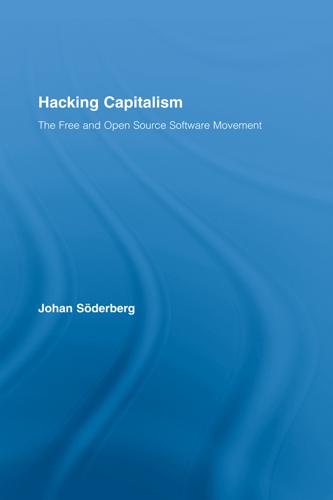
Hacking Capitalism
by
Söderberg, Johan; Söderberg, Johan;
With knowledge of this fact, the restricted economy of capitalism shows up as a mirror world of anti-production where the principle of life has been inverted. If the first bird was a bourgeois, he would sue the second bird for piracy. At each and every instant, private property acts as a stoppage. It could rightly be described as a ‘Tragedy of the Anti-Commons’. The term was made up by Michael Heller in his criticism of Garrett Hardin’s essay.22 Heller argues from a conventional economist’s perspective, but he reaches an unorthodox conclusion: An overly strong private property regime can cause under-use of resources. Conflicting ownership claims might prevent two parties from developing a resource.
…
Scott Shershow agrees with Goux but appeals for a rescuing of Bataille. Scott Cutler Shershow, “Of Sinking: Marxism and the ‘General’ Economy”. Critical Inquiry vol 27, no 3 (spring 2001). 21. Georges Bataille, The Accursed Share—An Essay on General Economy, vol.I (New York: Zone Books, 1988). 22. Michael Heller, “The Tragedy of the Anticommons: Property in the Transition from Marx to Markets”, Harvard Law Review (January 1998). 23. Marcel Mauss, The Gift: Forms and Functions of Exchange in Archaic Societies (London: Routledge, 1988). 24. Derrida declares that there can only be such a thing as a Gift if it is not thought of in terms of circulation and tit-for-tat exchange.